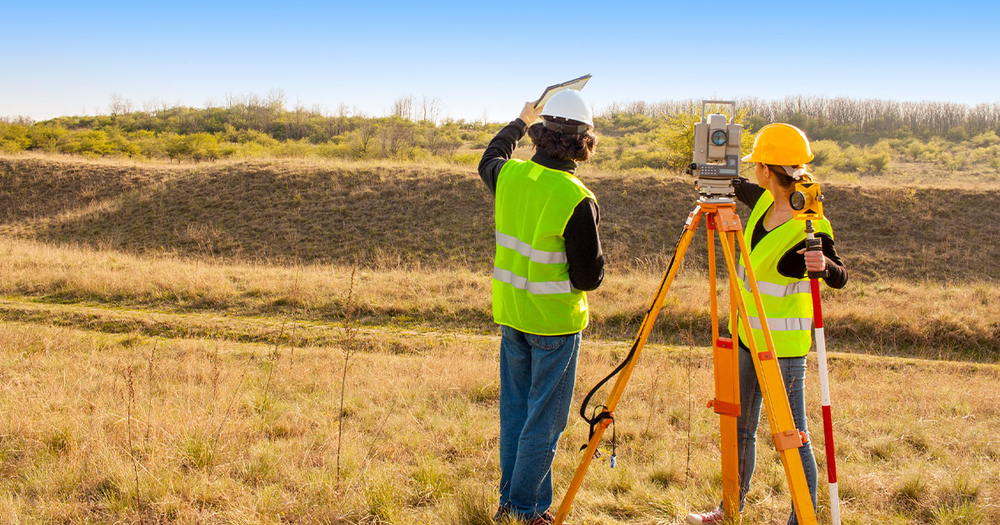
Getting a property survey can be an important step in establishing property lines and resolving land disputes with neighbors. However, many people may not know when a property survey would be helpful. Learning about when it is necessary to get land surveys can help avoid property disputes and other issues down the line.
Property surveys usually begin with legal research into descriptions of the land, including a history of the deed, a title search, and a previous survey of the land. This will confirm the name of the person who legally owns the property, a description of the property’s legal boundaries, and any relevant information about the land’s history.
After this initial research, the property surveyor will go out and sketch out the land, its boundaries and notable elements that make up the property. This step is called fieldwork.
Following the fieldwork, the surveyor will provide a map detailing the property’s legal boundaries, including where the property begins and ends. The survey will include a written description of the property, the street address, the location of buildings and adjacent properties, and any improvements a homeowner can make to the land.
Furthermore, a property survey might also include details about how to navigate shared property with neighbors, such as right-of-way and easements. This could cover a neighbor’s driveway or an overlapping backyard.
Many people perform property surveys by themselves. This is a viable route. See this link on how to conduct a land survey for more information.
However, a professional land surveyor is a more reliable option. Professional land surveyors are trained and licensed to make property line determinations, meaning that their chance of making an error is reduced. Furthermore, this license grants professional surveyors the power to provide legal documents proving property lines and property features.
Oftentimes, the government already holds an existing land survey on the property in question. These documents are quite complex, making them difficult to interpret. A professional surveyor can understand these documents more thoroughly than people without formal training.
Finally, sometimes property markers are buried or hidden. A professional land surveyor has the tools and expertise necessary to find those locations and determine their exact location.
The cost of a typical survey is in the range of several hundred dollars. This land survey cost is usually worth it to obtain an accurate legal description and avoid subsequent issues down the line.
There are a number of types of property disputes in which conducting a property survey is the best way to resolve the issue.
Anytime that new construction is occurring, a land survey should be conducted. Sometimes there are legal requirements that new structures are built a certain distance from the property line.
When people buy real estate, they are often hoping to build new properties or envision a plan for their land. Before any real estate transaction occurs, it is best to get a land survey so that everybody is on the same page about the boundary descriptions.
Often, the mortgage company will require a property survey before authorizing funding. Sometimes, all they will require is title insurance. Regardless, it is best practice to get a land survey.

Both sellers and potential buyers benefit, as it ensures that the deed has the proper information. Furthermore, a survey can prevent last-minute boundary disputes.
If you or a neighbor wants to construct a fence or a wall, a land survey can inform where to build. Unless you are sharing the cost with a neighbor, the structure must be built on your own property.

Easements
Easements grant the right of one property owner to use a part of another property for a specific use. For example, if a neighboring property blocks your access to an open public street, then you may have permission to walk across that property. The easements are generally reflected in the title report for your property.
Your zoning classification puts specific restrictions on how you can use your property. Consulting an attorney to learn about the legal ramifications outlined in your local zoning ordinances can help you to avoid an unforeseen legal issue.
Utility companies have a right to use a portion of your property for upkeep. Knowing the exact location of underground utilities is critical before excavation begins. The type of utility company could include water, electric, gas, telephone or telegraph pipes, wires, drains, and more.
Above ground wires are visible and easy to report. Other lines, like underground cables, should be reported by the utility company. In this case, the land surveyor can include this in the new survey.
Oftentimes, properties have joint features, such as joint driveways, party walls, or overhangs. In these cases, you may be legally required to upkeep your own property as a way of supporting your neighbor’s property.
A typical report documents visible or surface waters that are above ground. For information about underground waters and wetlands, other professional inspections by different types of experts would be needed.
If there are any old cemeteries on your property, then the survey shows them. This provides historical preservation of information that may be lost to vandalism or weathering.
Land surveys offer a legally defensible map of the boundary lines and key elements of a property. There are many scenarios in which you should have your property surveyed. Professional inspections will offer the most reliable quality and a certified survey that can be used as evidence in a legal context.
The contexts in which land surveying is most useful are times when you need to determine the details of your property’s boundary lines. This includes building new structures, buying or selling property, managing joint property, and more.